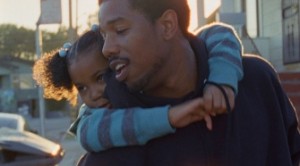Fruitvale Station
Fruitvale Station, 2013, 4 stars
Socially conscious Station packs a punch
From The Orlando Weekly, July 24, 2013
In the early hours of New Year’s Day, 2009, an unarmed, unassuming 22-year-old black man was shot dead by a white police officer on the platform of a train station in Oakland, California, setting off a firestorm of protest and debate over gun violence, police brutality and racial profiling. For his feature-film debut, writer-director Ryan Coogler has turned that tragedy and the events leading up to it into one of the most powerful and socially relevant movies of the year.
To get us to relate to the victim, Oscar Grant, played to perfection by Michael B. Jordan, and to appreciate him as a real man, with real hopes, real dreams and real flaws, Coogler opens Fruitvale Station with actual cell-phone footage of the incident before spending the next hour depicting a slightly fictionalized version of the previous day. We see Grant doing the mundane – fighting with his girlfriend (Melonie Diaz) and picking up his little girl from daycare – but we also get glimpses into his heart. He throws away hundreds of dollars’ worth of weed instead of selling it, he cares for a dying dog hit by a car, and he shows familial compassion.
We also see a troubled, angry man who fights with his mother (the excellent Octavia Spencer), loses his job and has spent time in prison for dealing drugs. But he’s a man just like you, regardless of your race or social background. He’s a man with a lot to live for, one who didn’t deserve to be arrested – let alone killed – while taking the train home on the first morning of his 23rd year of life.
Fruitvale is far from perfect. Some early scenes are forgettable, and Coogler uses too much handheld camera in a misguided attempt to be real and gritty. Admittedly, when accompanied by a slightly grainy look, the camerawork does produce the feel of a documentary, but Coogler should have opted for more Steadicam or traditional setups. He also fudges the facts slightly, most notably by not emphasizing a small piece of information that made the shooting slightly more understandable, but by no means forgivable. Still, Fruitvale is an even stronger directorial debut than Benh Zeitlin’s Beasts of the Southern Wild last year.
The socially significant timing of the movie is inescapable. Regardless of your feelings toward the George Zimmerman murder trial, and whether or not you think race played a role in Trayvon Martin’s death, there’s a good chance you’ll be brought to tears at the tragedy of nonsensical racial profiling that Coogler presents.
Though at its core Fruitvale Station is simply the story of one man, it is also something greater. It’s the heartbreaking tale of all young black men – or young men of any race – who are cut down in their prime for the wrong reasons, be them gun-related, race-related, drug-related, or all three. And if those young men happen to have even younger children, like Oscar Grant did, then we’re presented with the simplest yet saddest question of all: “Where’s Daddy?”
© 2013 Orlando Weekly / MeierMovies, LLC
